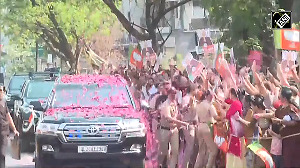Political commentators say the final outcome of the West Bengal assembly elections would depend on how some crucial factors play out this time. Mayank Mishra explains.

Hadda Haddi (close contest) is the expression frequently used by the people of West Bengal when asked to comment on which way the wind is blowing this time.
Ebar eto sohoj hobe na, a retired Indian Administrative Service officer who dabbled in politics for a while said to a reporter in Kolkata.
A range of people whom this reporter spoke to in seven districts spoke on similar lines.
They said with the coming together of the Left parties and the Congress, the electoral battle in the state had become too close for a call.
However, political commentators say the final outcome would depend on how some of the factors play out this time.
One of the major ones is how urban areas in the state vote.
In the 2011 assembly elections, the Trinamool Congress-led alliance swept the urban areas, with a vote share in excess of 50 per cent. The alliance won all the 52 urban seats with an impressive vote share of 57 per cent, according to Centre for the Study of Developing Societies. It won 65 of the 66 seats considered to be part of Greater Kolkata.
Moreover, of the 45 semi-urban seats, it won 39 with a vote share of nearly 51 per cent.
"I had covered the last elections. The slogan of poriborton (change) had really appealed to the people in the urban areas. There was an unprecedented surge for Mamata Banerjee. I have toured the state this time, too. The buzz is missing. If at all, there is some disappointment with the promised poriborton," a Kolkata-based political commentator said.
What he is hinting at is that the verdict in urban areas this time is expected to be mixed.
If that happens, it would be tough for the TMC to maintain the kind of lead it did in urban centres the last time.
Another factor is the geographical concentration of the seats TMC won last time.
The retired IAS officer said: "If you analyse the last assembly elections carefully, you will realise that TMC won maximum seats in six districts. What will decide the outcome this time is how the two Parganas (North and South 24 Parganas) vote."
They account for 64 of the 294 seats in the state and the alliance won 56 of these in 2011.
North 24 Parganas, the most populous district in the country with a population in excess of 10 million, alone has 33 assembly seats, which in itself is a record of sorts.
Other districts where the TMC had done exceedingly well in 2011 were Nadia, Hooghly, Howrah and Purbo Medinipur.
The sense one gets after talking to the people and political commentators is TMC might have a tough time doing an encore in these regions.
"We had a real tough time after the shocking defeat in 2011. However, with Jot becoming a reality, we hope to retrieve some of our lost grounds," Anand Chakravarty, a Communist Party of India (Marxist) activist said in North 24 Parganas district.
What gives him and his colleagues hope, he claims, is the consolidation of Muslim votes in favour of the Jot. Muslims account for more than 25 per cent votes in the two Parganas.
"TMC's unique selling point in the two Parganas is a leader like Abdul Razzak Molla. He is considered to be an influential Muslim leader and was a powerful minister in the Left government. All his life he was a communist. Now he has joined TMC. Do you think Left supporters will vote for him? To me, it seems unlikely. He is unlikely to bring incremental votes to the TMC in this region," a dhaba owner in Bantala, South 24 Parganas district observed.
One more crucial factor which would have a decisive impact on the outcome is how the Muslims vote.
Of the 87 seats where Muslims account for 30 per cent more votes, the TMC-led alliance won nearly 61 seats in the last elections.
Muslim-dominated constituencies include some in the districts of Murshidabad and Maldaha, which have been a traditional Congress stronghold.
The Congress, which was an ally of TMC in 2011, has an understanding with the Left this time.
"The feedback I am getting from the ground is that there is going to be dilution of support for TMC among the Muslims. But, it might still get a sizeable section of the Muslim votes," another Kolkata-based commentator remarked.
According to CSDS data, the alliance had a vote share of 45.3 per cent in the Muslim-dominated areas compared to the Left Front's 41.8 per cent. A marginal swing may alter the equation in these constituencies.












 © 2025
© 2025